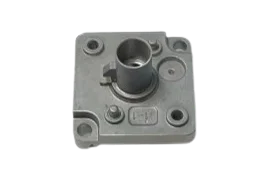Aluminum alloy brackets have become increasingly popular in various industries due to their unique properties and advantages. These brackets serve as essential components in the installation and support of a wide range of products, from industrial equipment to electronic devices. In addition, aluminum alloy brackets have good processing performance, are easy to form and weld, and are suitable for various complex design requirements. With the advancement of science and technology, the application scope of Aoke aluminum alloy brackets is also expanding, becoming an indispensable key component in modern manufacturing.

High Strength and Lightweight
One of the most significant advantages of aluminum alloy brackets is their high strength-to-weight ratio. Unlike traditional materials such as steel, aluminum alloys provide a robust support structure while remaining lightweight. This characteristic is particularly beneficial in applications where weight reduction is crucial, such as in aerospace and automotive industries. The lightweight nature of aluminum alloy brackets allows for easier handling and installation, reducing labor costs and improving overall efficiency.
Corrosion Resistance
Another critical feature of aluminum alloy brackets is their excellent resistance to corrosion and oxidation. Aluminum naturally forms a protective oxide layer when exposed to air, which helps prevent further degradation. This property makes aluminum alloy brackets ideal for use in harsh environments, such as marine applications or chemical processing facilities. By resisting corrosion, these brackets can significantly extend the service life of the products they support, reducing the need for frequent replacements and maintenance.
Versatility in Applications
Aluminum alloy brackets are incredibly versatile and can be used in various applications across multiple industries. Some common uses include:
Industrial Equipment: Aluminum alloy brackets provide reliable support for machinery and equipment in factories and manufacturing plants. Their strength and durability ensure that they can withstand heavy loads and vibrations.
Construction: In the construction industry, aluminum alloy brackets are used to support structural elements, such as beams and trusses. Their lightweight nature makes them easier to transport and install, while their strength ensures stability.
Electronics: The electronics industry often utilizes aluminum alloy brackets for mounting components and devices. Their corrosion resistance is particularly valuable in this sector, where exposure to moisture and chemicals can be detrimental.
Mechanical Accessories: Aluminum alloy brackets are also used in various mechanical applications, such as automotive parts and machinery components. Their ability to withstand stress and strain makes them a reliable choice for these applications.
Advanced Processing Technology
The manufacturing process of aluminum alloy brackets involves advanced processing techniques that enhance their performance and durability. Techniques such as extrusion, machining, and anodizing are commonly employed to create high-quality brackets that meet specific requirements.
Extrusion allows for the production of complex shapes and designs, enabling engineers to create brackets tailored to their needs.
Machining ensures precise dimensions and tolerances, which is crucial for applications requiring exact specifications.
Anodizing adds an additional layer of protection against corrosion and wear, further extending the lifespan of the brackets.
Cost-Effectiveness
While aluminum alloy brackets may have a higher initial cost compared to some traditional materials, their long-term benefits often outweigh the initial investment. The durability, corrosion resistance, and lightweight properties of aluminum alloy brackets lead to lower maintenance costs and longer service life. Additionally, the ease of installation can result in reduced labor costs, making them a cost-effective solution in the long run.
Environmental Considerations
In today's environmentally conscious world, the sustainability of materials is a significant concern. Aluminum alloy brackets are an eco-friendly choice, as aluminum is a highly recyclable material. The recycling process requires only a fraction of the energy needed to produce new aluminum, making it a more sustainable option. By choosing aluminum alloy brackets, companies can reduce their environmental footprint and contribute to a more sustainable future.
In conclusion, aluminum alloy brackets offer numerous advantages, including high strength, lightweight properties, corrosion resistance, and versatility in applications. Their advanced processing technology and cost-effectiveness make them an ideal choice for various industries, from construction to electronics. As companies continue to prioritize sustainability, the use of aluminum alloy brackets will likely increase, further solidifying their position as a preferred support structure in modern applications. By understanding the benefits and applications of aluminum alloy brackets, businesses can make informed decisions that enhance their operations and contribute to a more sustainable future.
https://www.aoprecision.com/advantages-and-applications-of-aluminum-alloy-brackets.html

